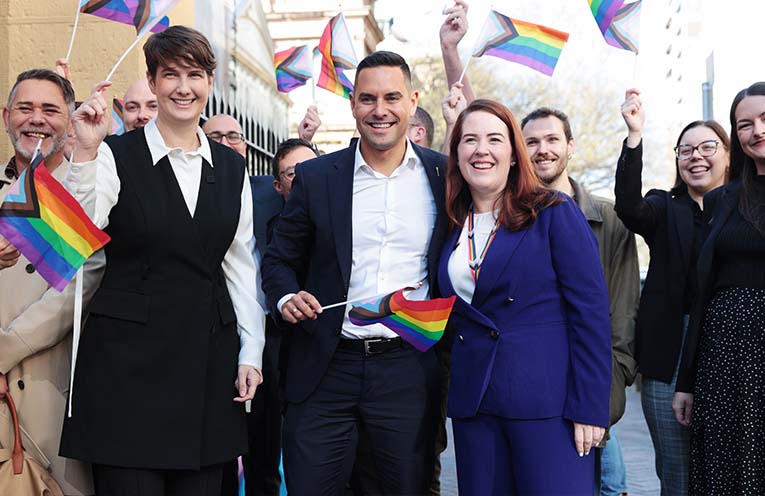
ANTI-DISCRIMINATION laws remain outdated in NSW despite recent changes that are set to improve equality for LGBTQI communities, advocates say.
A wide-ranging but watered-down bill, drafted by independent MP Alex Greenwich, was passed into law in NSW parliament last Thursday night after a 15-12 upper-house vote.
It removes the requirement for transgender people to have surgery to change their birth certificates, bringing the state into line with the rest of the country.
The bill had reopened deep rifts within the Liberal Party over transgender issues and caused a moderate MP to cross party lines to support the suite of legal changes.
To get the Labor government over the line, amendments to the state’s anti-discrimination act were dropped, including protections for LGBTQI teachers and students at private schools.
Equality Australia chief executive Anna Brown said the reforms were a watershed moment for Australians but more work needed to be done.
“Now we turn our attention to the state’s anti-discrimination laws,” she said on Friday.
“It is unfathomable that in 2024 students and teachers can still be lawfully discriminated against when they walk through the school gates … it’s time for these laws to change.”
The government has said it is awaiting the results of a Law Reform Commission review of the act.
But the commissioning of that review showed Labor also believed the anti-discrimination act was “an outdated piece of legislation”, Mr Greenwich said.
He would also continue to work to ensure better protections for sex workers, people with disabilities and people of faith.
“There is a lot of common ground between the LGBT community and the faith communities, we both face a great deal of vilification and discrimination,” Mr Greenwich said.
Justice and Equity Centre policy director Alastair Lawrie said the anti-discrimination review must be prioritised quickly.
“NSW laws still fail to protect bisexual, non-binary and intersex people against discrimination and vilification,” he said.
The Greens tried unsuccessfully to tack the anti-discrimination act changes back onto the omnibus bill during upper-house debate.
MP Jenny Leong accused Labor of having “caved into the conservatives and anti-LGBTIQA+ forces in their own party”.
Introducing changes to ten different sets of laws, the passed legislation increases the time to register a birth if variations of sex characteristics make it difficult to determine sex and creates an offence for threatening to out a person’s LGBTQI status or sex-work history.
It also provides a pathway for children born out of overseas commercial surrogacy arrangements to have their parents recognised on their birth certificate.
The opposition criticised the omnibus bill for going “too far, too quickly”, citing internal concerns about women’s safety once transgender people could more easily change the sex listed on their birth certificate.
That argument was condemned as fear mongering by North Sydney Liberal MP Felicity Wilson, who crossed the floor to back the laws in the lower house.
Along with the Liberals and Nationals, some independent crossbenchers from urban fringe or regional electorates either opposed the bill or abstained from voting.
But it passed with the support of Labor, the Greens and progressive crossbenchers.
By Luke COSTIN and Neve BRISSENDEN, AAP
